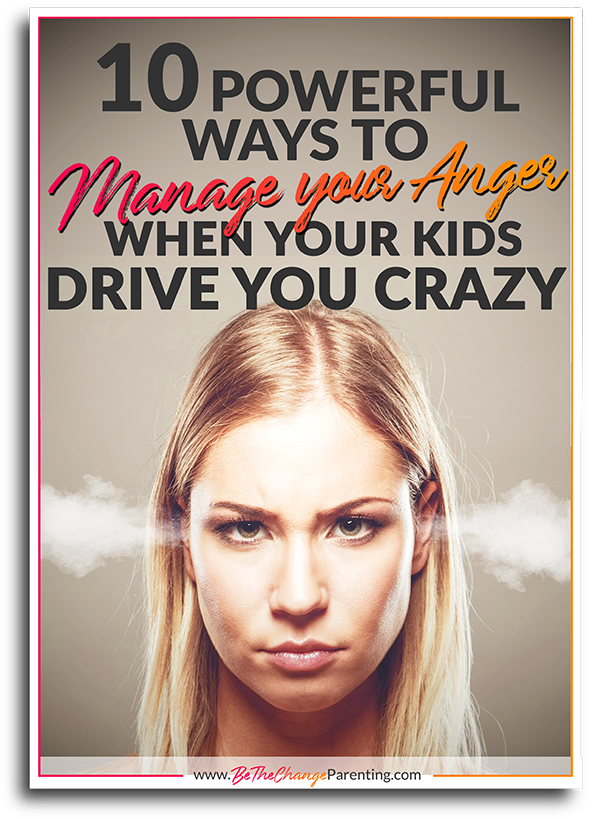
anger Management Classes
For Parents
anger management for Parents
‘How DARE you talk to me like that!!!’
‘Why are you hitting your brother AGAIN?’
‘Clean up this mess for the hundredth time!!!’
‘This behavior is unacceptable! Is this how I raised you?’
Look, I have kids too, 8 of them to be exact. And I know how crazy and impossible they can get – and I know that feeling of anger that builds up inside of you sometimes.
And I know the guilt….
...and I know the damage that anger can cause – in their self-esteem, their behavior, and your relationship with them.
Look. You are good, caring, loving parent. You want the best for your kids. (I know cuz otherwise why would you be here?:)
Sometimes when our kids provoke us we find ourselves reading from a lousy script. Whether you’ve learned these lousy scripts from powerful role models or simply by trial and error - cuz you can’t figure out how to get your kids to listen otherwise – that is what has stuck until now.
But! Once you learn that there are some seriously powerful and effective alternatives – change will come – I guarantee it!
Here are some beginner anger management tips for parents just like you – who love their kids with a passion and want the best for them in every way.
10 Tips to Tame Your Temper
1. Recognize that It’s not about you
Your kids blow up and explode at you… but it’s often not about you.
Your kid’s trying to keep up with the trends, being fashionable, social pressures, school work… and things happen that are frustrating him.
So he comes home and flips out about your terrible dinners. But. That’s not actually what’s bothering him. He’s upset about something that happened hours ago at school!
Meanwhile you get the be the dumping ground – you and the rest of the house. I hear ya. Not fun. But if you can recognize that it’s not about YOU – you’ll be able to have some much needed perspective that will help you keep calm and figure out how to handle the situation.
‘When you blame others, you give up your power to change.’
- Robert Anthony
2. Quit the Blame game
You know the feeling of needing to find someone to point the finger at?
‘Who left the glass at the edge of the table? Of course it fell!’
The need to find the culprit and just give them a piece of your mind. That’s the blame game.
Dr. Laura Markham says in her article Can You Love Unconditionally When You’re Furious? ‘When we indulge our anger, we’re acting from blame and revenge – and we’re modeling inappropriate behavior for our child.’
Blame brings you in the wrong direction – to an angry slippery slope.
Get off that slope and quit playing that game!
Instead work on finding a solution, prevention for the future, and nurturing your relationship with your child – which is by far more important that pointing any finger.
3. Look for the content
Hear the emotions and experiences. When your kid is screaming at you, try to leave the angry tone at the door and listen to the content of what is being said.
This works especially well when you’re listening to an angry teen. They need to know that you’re listening and that you care. Try to absorb the content of what they’re saying and leave the fact that they’re screaming out of the picture for the time being.
You can come back later when they’ve calmed down and deal with the disrespect issue then.
☞ If you like this post, you will love: Positive Discipline: How to Get Mind Blowing Results
4. Change the Picture in your Head
It shouldn’t be this way… is the thought that often dictates our emotions.
Samantha shouldn’t talk to me like that!
‘What screws us up most in life is the picture in our head of how it’s supposed to be.’
-Socrates
Jimmy shouldn’t pick fights with his brother!
Sara shouldn’t leave a mess wherever she goes!
The truth is that the goal of parenting is not to raise perfectly well behaved and mannered children. The goal of parenting is to raise well adjusted, kind and capable ADULTS!
You child isn’t perfect? That ok. Actually that’s more than ok – that’s the way it’s supposed to be. Your child is perfectly healthy if they test the boundaries, pick fights, and act lazy.
It SHOULD be this way. Now it’s time to brainstorm and see how you can use your parenting skills and intuition to motivate change.
Notable quote: ‘What screws us up most in life is the picture in our head of how it’s supposed to be.’ - Socrates
5. Develop Patience & tolerance
Be honest with me. If you were to be a super patient parent – would you get angry as often?
How many times do you blow your horn when your kids take too long or keep you waiting.
Hey, I’m not judging here, I’m in the same boat as you. I’ve lost it literally hundreds of times with my kids just for lack of patience….
That’s why developing patience is oh so important when it comes to anger management for parents – cuz these kids seriously test our patience!
☞ If you like this post, you will love: Angry Child: Here’s How to Tame the Outbursts
6. Remember that Anger is an outer shell
What’s the emotion beneath your anger? So often we get hurt – and don’t want to show our weakness to those around us – so we get angry – instead of showing our pain.
‘Anger is almost never a primary emotion in that even when anger seems like an instantaneous, knee-jerk reaction to provocation, there’s always some other feeling that gave rise to it.’ Quoting Leon Seltzer in his article What Your Anger May Be Hiding.
Get used to feeling your emotions and expressing your emotions.
Be Vulnerable.
The first step to open communication and helping someone else to understand us is by expressing our true feelings – not covering it up with anger.
7. Awaken your Compassion
Feel compassion instead of trying to get even.
Awaken your humility – instead of ‘how dare you hurt me’ – try thinking ‘I’m just a regular parent who makes mistakes just like the next guy.’
If you want other people around you to forgive you for your mistakes, then learn to be forgiving of theirs.
☞ If you like this post, you will love: How to Detect a Child’s Lie in Just Seconds
8. Ask Questions
Are you a mind reader? Do you really know what was going through your 9-year-olds mind when he made the kitchen sink overflow with his newest experiment?
Or what your teen was thinking when he snuk in after curfew?
Ask questions – don’t jump to conclusions. You can’t read their mind, just slow down and ask questions. Chances are there’s a perfectly good explanation for their behavior.
And even if there isn’t you’ve just gotten to know your child a little bit better and how she thinks.
☞ If you like this post, you will love: How to Talk So Your Kids LOVE to Listen
9. Use CBT for Anger Management
CBT (Cognitive Behavioral Therapy) is based on the concept that how we think (cognitive thoughts), how we feel (emotions) and how we act (behavior) are all connected. Meaning, our thoughts create our emotions and often determine our behavior. In other words:
Our thoughts create our emotions and our emotions create our reality.
Therefore, negative thoughts can cause us to behave negatively. But if we can go into your mind and change your thoughts – well that will change your emotions and therefore your behavior.
Want to hear about a true story of how this technique changed a man’s life? Read it in my post: What Anger Management Coaching Looks Like for You
10. Find the trigger
What made you blow up? Were you tired? Was the house a mess? Is there a subconscious belief that you need to change?
If you can figure out what is at the root of your angry outburst – what sets you off – you’ve just discovered a goldmine!
Finding the trigger to your anger is finding the key to setting you free from it! It’s not an instant fix – but it’s the cornerstone for changing your inner dialogue and freeing your from anger.
What to do when you get angry:
1. Cut the Blame short.
First thing that happens after we get angry is we blame someone. How dare they, did you see what she did, how could you do that?
This just makes the angry feelings grow, because now you’re getting someone else angry with you and it can just spiral out of control.
Cut the Blame short. Try to just be quiet.
2. Breathe deep.
When you get angry, your heart rate and blood pressure increases, causing blood to flow more rapidly from your brain to your arms and legs.
Your adrenaline is pumping and you’re feeling that fight or flight – which is taking oxygen away from your brain, so you’re not thinking clearly.
Slow deep breathing will help reverse your body’s fight or flight response. You also increase the oxygen to your brain. This enable you to think more clearly and regain control of your thought processes. It can help relax your muscles, relax your forehead and face.
Take Deep breaths. Counteract the fight or flight stress response.
☞ If you like this post, you will love: I Had a Bad Day Today - How to Stay Calm with the Kids
3. Cool Off.
Do anything to cool off. Lock yourself in a room. Go for a walk. Meditate.
Just repeat over and over ‘I’m calm and collected’.
Whatever you need to do to completely cool off – do it.
Don’t react to anyone or say anything that you will regret later.
4. Concentrate on positive emotions
Prepare a picture of your family – a family photo or perhaps grandparents that you miss.
Or find a quote that inspires you – that lifts you up when you read it.
The point is to take your mind away from the situation that has made you angry and turn to something that changes your emotions – to love or inspiration – or any emotion that will bring you out of your anger and back to a place where you can think straight.
5. Wait to Correct
Wait until your anger has passed so you can think clearly.
You never want to give a rebuke when one or both parties are in a low state.
That means that if either you or your child are angry – then just wait. You’ll have time for rebuke late, when you’ve calmed down and can think things out.
Giving a rebuke at the wrong time will not only not be effective, it will likely damage your relationship with your child.
Stay strong and bite your tongue! It’s hard. But you can do it!!!
After the Anger has Passed
You’ve calmed down and you’re realizing that you lost it… again! These important steps will help get you back on track and help you move past the guilt of having blown your top yet another time as well as help you avoid having the same angry episodes happen again.
1. Don’t stay in the Guilt.
After you’ve gotten angry you often feel guilty.
“I lost it with my 5-year-old again! I can’t believe I did that!”
Guilt is natural. It’s also a good sign, because it shows that you admit that you got angry and that you don’t want to be doing that.
Some people can’t admit that they are wrong. The fact that you feel guilty is a sign that you can admit when you’re wrong.
But don’t stay there because it’s not going to help you. The guilty feelings will only bring you down which don’t help anyone improve.
As Guy Winch explains in his article 10 Things You Didn’t Know About Guilt, ‘Guilty feeling make it difficult to think straight. Studies have found that concentration, productivity, creativity and efficiency are all significantly lower when you’re feeling actively guilty.’
The guilt is not only unproductive – it’s harmful. You can literally not think straight when you’re wallowing in guilt – so how can you focus on your kids and parenting techniques?
Instead of staying in the guilt - take out the diamonds that you can learn from this experience to help make you more aware of yourself for the future.
☞ If you like this post, you will love: I Hurt My Child in Anger – What Do I Do?
2. Brainstorm.
What was it that set me off? Why did I get angry?
This awareness is a goldmine!
Story time:
I remember a while back, I had gotten angry one night when we were out. I actually flipped out at my 5-year-old in the middle of the street…. I know insane, right?
I had been sick in bed for 2 days, and just as I was coming out of it and starting to feel better, my daughters reminded me that we had planned to go out to an evening party that the whole family was invited to.
I considered whether I should go as I certainly wasn’t 100% but the kids were looking forward, so I gave in and off we went.
To say that the party was running late was an understatement. The hosts kept announcing that they were going to tell this unbelievable story about what had happened to them, so my kids didn’t want to leave.
To make a long story short, it was 10 o’clock already and my two little guys were starting to fight, and one was starting a temper tantrum.
I finally told my older kids ‘that’s it, we’re leaving even if they haven’t told the story yet’. I went outside juggling the two fighting/one tantruming kid and I was waiting for the older kids to come out the door. And that’s when I finally lost it at the tantruming kid….
And of course when the older kids finally came out, they got their fair share of blame for making me wait so long.
It was a disaster…. which of course led to lots of guilt in the aftermath.
But this time I decided that instead of wallowing in the guilt, I was going to brainstorm and learn from the experience.
What was it that made me lose it?
Firstly, I was sick. I really should not have gone out. This party was not so important. The older kids could have gone on their own. If it had been my daughter’s school play, then it would have been worth it. But this wasn’t. I should have stayed in bed. I couldn’t physically handle the temper tantrum. I was sick.
Secondly, I cannot expect a 5-year-old to stay up past 10 o’clock and not have a temper tantrum. Not good planning.
Thirdly, as much as I expect my teenage kids to help out, if they’re having a good time and anticipating a fun story, it’s not fair to pop on them that we’re leaving right now and not expect complaints and some who are dragging their feet.
This brainstorming was awesome!
So much better than wallowing in guilt! I actually got somewhere productive!
I was expecting a lot from both myself and my kids. And the fact that I fell apart only went to prove that I’m not super woman. In other words, anyone else would have fallen apart in the same situation.
Not only that – I now have a much greater clarity for the future that I need to make these kinds of decisions, knowing that the consequence will be a cranky child and an agitated mommy.
☞ If you like this post, you will love: What Anger Management Coaching Looks Like for You
3. Make an action plan
Have you ever heard that practice makes progress?
Plan ahead for the next time your child will repeat the same misbehavior he always does… cuz you know he’s going to do it again!
How will you react? What will you do differently? What exact words will you say?
The more you can really picture the situation and visualize what you will say and how you’ll react – the more you actually practice this happening in reality – the more change you’ll be able to make this practicing into action.
4. Seek Anger Management Coaching
There’s nothing wrong with seeking help when you feel that you need it!
I’ve had some of my most incredible aha moments when working with a coach.
When I see parents for private coaching about anger management we often work on their subconscious beliefs – I literally have a little walk around their subconscious mind – and together we find the core subconscious beliefs that are setting off their anger.
Then we can rewire those core beliefs which are triggering the angry outburst. The whole process is pretty incredible.
Feel free to book a private coaching session. Or if you need a 15-minute consult – either way - I’m here for you.
Anger management for parents with lively kids or kids who test the boundaries a lot – is challenging!
But I know you’re up for the challenge! How do I know? Cuz you’ve made all the way to the end of this article all about anger management tips for parents – and that means you’re motivated – and that’s the key ingredient for your success!


















